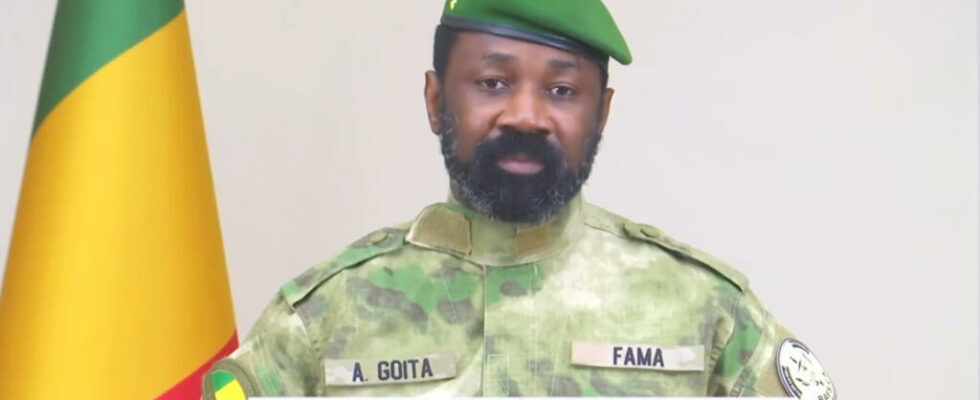In his address to the nation, Tuesday evening, December 31, General Assimi Goïta announced that 2025 would be “ the year of culture “. The Malian transitional president also welcomed the action of the national army over the past year. On the other hand, he did not mention, not even mention, the question of possible elections. Political actors, observers, simple citizens, many were those who were waiting for a possible announcement on the subject, four and a half years after the military coup of August 2020. Political reactions from the president of ADEPM Aboubacar Sidick Fomba (support transitional authorities), former Prime Minister Moussa Mara (Yelema, opposition), and analysis by Malian political scientist Oumar Berté.
2 mins
• “ The election is not the priority of either Malians or the authorities today »
Aboubacar Sidick Fomba is president of the ADEPM party (Democratic Alliance of the Malian People), member of the National Transitional Council (CNT) and fervent support of the military authorities in place. He considers it entirely justified that the general Assimi Goïta did not address the issue of elections.
The priority of Malians today is not the organization of elections in a disorganized state, in a war for survival, and which is especially threatened by the Western collective. We are rather for the reconstruction of our country, the recovery of integrity [du territoire, NDLR] and the adaptation of the defense system in relation to the threats that the AES space experiences. The election is neither a priority of the Malian people, nor a priority of the authorities of Mali today. I remember three things from the speech of the president, army general Assimi Goïta. One, a new Malian through the national program of education in societal values. Secondly, President Assimi Goïta announced an economic emergence of our country to allow the Malian people to have food at controlled prices, and to initiate economic development based on our mining resources. Third, progress in the operationalization of Mali’s security forces to reconquer the entire territory.
Aboubacar Sidick Fomba, president of the ADEPM party
• “ The Transition is running out of steam, Malians are waiting for elections »
Much less enthusiastic reaction from former Prime Minister Moussa Mara, whose Yelema party is demanding the organization of elections for the return to constitutional order, and who does not hide his disappointment after the wishes of General Assimi Goïta.
It is clear that we all expected it to open up clear perspectives on the question of elections, especially since the government itself included in the 2025 budget the resources to be able to do facing the elections. But it is the presidential speech that sets the tone for the year 2025, and the fact that nothing has been said on the subject is puzzling to say the least because today, it is obvious that the overwhelming majority Malians are waiting for the end of the Transition and the elections, for the return to the constitutional order of our country. As a political actor, it is a disappointment, because today the Transition is running out of steam. The living conditions of Malians are deteriorating rapidly. We lack electricity, and electricity is essential for everything, even for the promotion of culture that it [Assimi Goïta, NDLR] intends to launch in 2025: without electricity, it will be very difficult. And on this question we had no perspective either [dans le discours présidentiel, NDLR]. The ideal solution to all this is that we have elections to put an end to this parenthesis and for the country to start again.
Moussa Mara, former Prime Minister
• “ We are far from reconciliation, the organization of elections will be complex »
Oumar Berté is a Malian lawyer and political scientist at the University of Rouen. He notes that the reconciliation of the putschist military authorities and the Malian political class is far from being achieved. This is further evidenced by the sentencing on Monday to two years in prison, one of which is fixed, of Issa Kaou N’Djim, a figure in political and media life in the country. The Malian opposition also continues to demand the release of many other “ prisoners of conscience “. For Oumar Berté, this context of tension complicates any electoral perspective.
We have been in the same dynamic for a while in this country: all dissonant voices are reduced to imprisonment or intimidation. Former Prime Minister Ousmane Issoufi Maïga, who was responsible for the drafting of a peace charter, recently obtained the release of eleven detained political executives, but at the same time the Justice system continues to sentence people to heavy sentences for simple offenses of opinion, this poses a problem for freedom of opinion in this country, and for the reconciliation that they [les autorités maliennes de transition, NDLR] intend to advocate with the political class and all components of society.
Oumar Berté, Malian lawyer and political scientist at the University of Rouen
This relaxation, this appeasement that the Malian transitional authorities present as an objective in the run-up to elections, ultimately seems very distant. “ We are clearly very far from it », adds the researcher. “ If we condemn political actors – we must also remember that a party leader was kidnapped this weekend – this poses a problem for the trust that politicians can have in those in power, to work together. So, we are clearly in a situation which risks making the organization of elections very complex. »
Also readMali: Assimi Goïta evokes a “year of culture” in his wishes to the Nation
